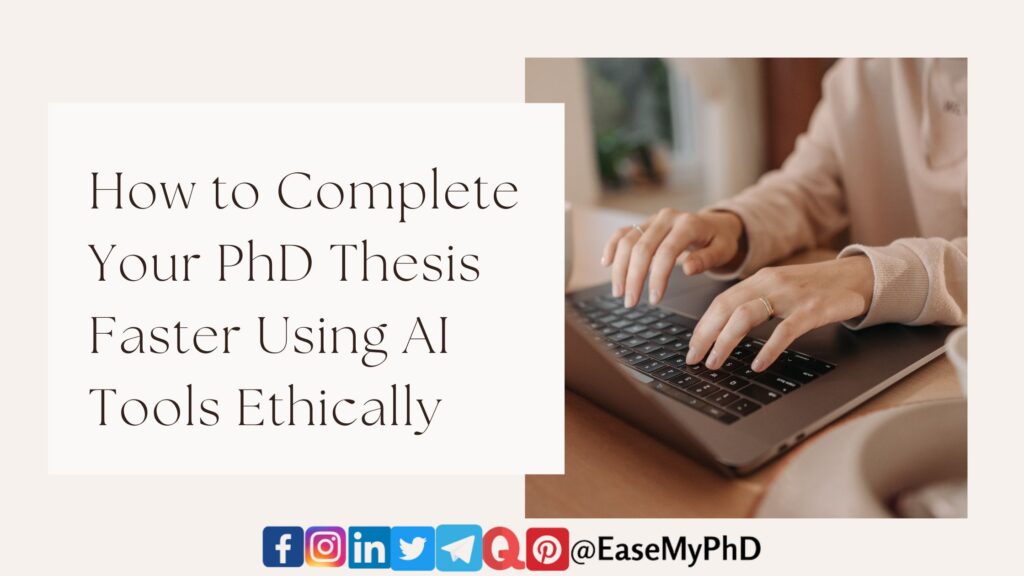Embarking on a PhD journey is akin to running a marathon; it requires perseverance, resilience, and a strategic approach. In today’s digital era, leveraging Artificial Intelligence (AI) can expedite the process while maintaining ethical standards. This blog article delves into how to complete your PhD thesis faster using AI tools ethically, ensuring you stay true to academic integrity.
Understanding the Role of AI in Academia
AI tools are revolutionizing various fields, including academia. From data analysis to literature review, AI can streamline numerous aspects of your research process. However, the ethical use of these tools is paramount. Misuse can lead to plagiarism, inaccuracies, and ethical breaches that can tarnish your academic reputation.
The Ethical Use of AI in Your PhD Thesis
Ethical use of AI tools involves transparency, accuracy, and integrity. Here are key principles to adhere to:
- Transparency: Clearly state the AI tools used and their role in your research.
- Accuracy: Ensure the data and analyses generated by AI tools are verified and accurate.
- Integrity: Avoid plagiarism by properly citing any AI-generated content or insights.
AI Tools to Expedite Your PhD Thesis
1. Literature Review
Conducting a thorough literature review is foundational to any PhD thesis. AI tools like Connected Papers and Litmaps can help by mapping out related research papers and visualizing the connections between them. This not only saves time but also ensures a comprehensive review of existing literature.
2. Data Collection and Analysis
AI tools such as NVivo and Atlas.ti can expedite qualitative data analysis by identifying patterns and themes in your data. For quantitative data, tools like SPSS and R offer powerful statistical analysis capabilities.
3. Writing Assistance
Writing can be one of the most time-consuming parts of a PhD thesis. Tools like Grammarly and Hemingway Editor help improve writing quality by suggesting grammatical corrections and stylistic improvements. Scrivener can also assist in organizing your writing and maintaining focus.
4. Reference Management
Efficient reference management is crucial for any academic work. Tools like Zotero, EndNote, and Mendeley can help organize and format your references according to various citation styles.
5. All in One AI Research tools
AI and Ethics: Finding the Balance
While AI tools offer significant advantages, it is crucial to balance their use with ethical considerations. Here are some tips to ensure ethical use:
- Use AI as a Complement, Not a Substitute: AI tools should complement your research, not replace critical thinking or original contributions.
- Cite AI Tools: Always cite the AI tools used in your research. This transparency reinforces academic integrity.
- Verify AI-Generated Data: Cross-check the accuracy of AI-generated data and insights. Human oversight is essential.
- Avoid Over-Reliance on AI: While AI can expedite certain tasks, over-reliance can undermine the quality of your research. Maintain a balance.
Practical Steps to Complete Your PhD Thesis Faster
Now that we understand the ethical use of AI tools, let’s explore practical steps to complete your PhD thesis faster:
- Set Clear Goals and Deadlines: Break down your thesis into manageable tasks with clear deadlines. This helps maintain focus and momentum.
- Leverage AI Tools: Use AI tools for literature review, data analysis, and writing assistance, as mentioned earlier.
- Regularly Review Progress: Regularly review your progress and adjust your plan as needed. This ensures you stay on track.
- Seek Feedback: Regularly seek feedback from your supervisor and peers. Constructive feedback can help identify areas for improvement.
- Maintain Work-Life Balance: Avoid burnout by maintaining a healthy work-life balance. Regular breaks and self-care are essential.
Case Study: Ethical Use of AI in PhD Research
Let’s consider a case study of a PhD student, Alex, who utilized AI tools ethically to complete his thesis faster:
Background: Alex was working on a thesis in the field of cognitive psychology. The research involved analyzing large datasets and conducting a comprehensive literature review.
Challenges: The primary challenges Alex faced were the time-consuming nature of data analysis and the extensive literature review required.
AI Tools Used:
- NVivo: For qualitative data analysis.
- Connected Papers: To map out related research papers.
- Grammarly: To improve writing quality.
- SciSpace: All in One AI Research Tool
Ethical Considerations: Alex ensured ethical use by:
- Clearly stating the AI tools used in his methodology section.
- Cross-checking AI-generated data and insights.
- Properly citing any AI-generated content.
Outcome: By leveraging AI tools ethically, Alex was able to complete his PhD thesis six months ahead of schedule while maintaining high academic standards.
Completing a PhD thesis is a monumental task, but AI tools can significantly expedite the process when used ethically. By adhering to principles of transparency, accuracy, and integrity, you can harness the power of AI to enhance your research while maintaining academic integrity. Remember, AI tools are there to complement your efforts, not replace them. With a strategic approach and the right tools, you can complete your PhD thesis faster and embark on your academic journey with confidence.

